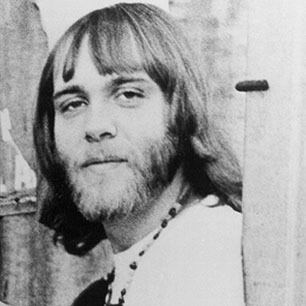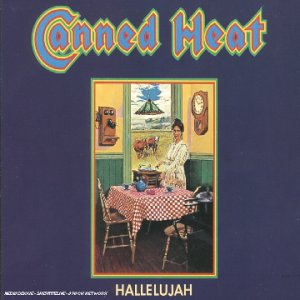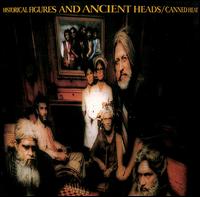
Canned Heat is an American blues and rock band that was formed in Los Angeles in 1965. The group has been noted for its efforts to promote interest in blues music and its original artists. It was launched by two blues enthusiasts Alan Wilson and Bob Hite, who took the name from Tommy Johnson's 1928 "Canned Heat Blues", a song about an alcoholic who had desperately turned to drinking Sterno, generically called "canned heat". After appearances at the Monterey and Woodstock festivals at the end of the 1960s, the band acquired worldwide fame with a lineup of Hite (vocals), Wilson, Henry Vestine and later Harvey Mandel, Larry Taylor (bass), and Adolfo de la Parra (drums).

Henry Charles Vestine a.k.a. "The Sunflower", was an American guitar player primarily known as a member of the band Canned Heat. He was with the group from its start in 1965 to July 1969. In later years he played in local bands but occasionally returned to Canned Heat for a few tours and recordings.

Alan Christie Wilson, nicknamed "Blind Owl", was an American musician, best known as the co-founder, leader, co-lead singer, and primary composer of the blues band Canned Heat. He sang and played harmonica and guitar with the group, live and on recordings. Wilson was the lead singer for the group's two biggest U.S. hit singles: "On the Road Again" and "Going Up the Country".

"On the Road Again" is a song recorded by the American blues rock group Canned Heat in 1967. A driving blues rock boogie, it was adapted from earlier blues songs and includes mid-1960s psychedelic rock elements. Unlike most of Canned Heat's songs from the period which were sung by Bob Hite, second guitarist and harmonica player Alan Wilson provides the distinctive high pitched vocal, sometimes described as a falsetto.

Canned Heat is the debut studio album by American blues and rock band Canned Heat, released shortly after their appearance at the 1967 Monterey Pop Festival. The album consists of covers of traditional and popular blues songs.

Boogie with Canned Heat is the second studio album by American blues and rock band Canned Heat. Released in 1968, it contains mostly original material, unlike their debut album. It was the band's most commercially successful album, reaching number 16 in the US and number 5 in the UK.

Future Blues is the fifth album by American blues and rock band Canned Heat, released in 1970. It was the last to feature the band's classic lineup, as Larry Taylor and Harvey Mandel had both departed by July 1970, prior to its release to record with John Mayall and songwriter Alan Wilson died shortly after on September 3, 1970. It was also the only classic-era Canned Heat studio album to feature Mandel, as Henry Vestine had been the lead guitarist on the previous albums. Their cover of "Let's Work Together" by Wilbert Harrison became a hit. "London Blues" features Dr. John. It was re-released on CD in 2002 by MAM productions with five bonus tracks.

Living the Blues is the third album by Canned Heat, a double album released in late 1968. It was one of the first double albums to place well on album charts. It features Canned Heat's signature song, "Going Up the Country", which would later be used in the Woodstock film. John Mayall appears on piano on "Walking by Myself" and "Bear Wires". Dr. John appears on "Boogie Music". The 20-minute trippy suite "Parthenogenesis" is dwarfed by the album-length "Refried Boogie", recorded live.

Hallelujah is the fourth album by Canned Heat, released in 1969. It was re-released on CD in 2001 by MAM productions with four bonus tracks. It was the last album to feature classic lineup mark 1, as Vestine left the band prior to Future Blues.

Robert Ernest Hite was the co-lead vocalist of the American blues and rock band Canned Heat, from 1965 to his death in 1981. His nickname was "The Bear".

Hooker 'n Heat is a double album released by blues musician John Lee Hooker and the band Canned Heat in early 1971.

Let's Work Together: The Best of Canned Heat is a compilation album by Canned Heat, released in 1989. All of the songs are taken from the first five albums released on Liberty Records between 1966 and 1970, except for "Rockin' with the King", which is from the United Artists Records album Historical Figures and Ancient Heads (1971).

Canned Heat '70 Concert Recorded Live in Europe is a 1970 live album by Canned Heat. The album is taken from various locations on live concert European tour right before Alan Wilson's death and is the band's first officially released live album.

Vintage is the sixth album by Canned Heat. Produced by Johnny Otis, the album featured the Muddy Waters/Elmore James' song "Rollin' and Tumblin'" recorded with and without Alan Wilson's harmonica leads. These sessions have surfaced on a multiple of reissues including, Don't Forget to Boogie: Vintage Heat (2002), Vintage Canned Heat (1996), Eternal Boogie, Canned Heat in Concert and various other releases.

Live at Topanga Corral is a 1971 live album by Canned Heat. The album is taken from a 1968 concert at the Kaleidoscope in Hollywood, California and not at the Topanga Corral as the title suggests. Canned Heat was under contract to Liberty Records at the time and Liberty did not want to do a live album, so manager Skip Taylor told Liberty that the album had been recorded in 1966 & 1967 at the Topanga Corral and released the record with Wand Records to avoid legal complications. The record has been bootlegged and reissued countless times, and is also known as Live at the Kaleidoscope.

Historical Figures and Ancient Heads is the eighth album by Canned Heat, released in 1971. It was the first album not to feature original member and songwriter Alan Wilson who had died the previous year, and their bassist Larry Taylor, who had left to join John Mayall's band. Featuring new guitarman Joel Scott Hill and Little Richard on "Rockin’ With the King". The record also includes Tony de la Barreda on bass, who left with Hill after this album and subsequent tour.

The New Age is the ninth studio album by Canned Heat, released in 1973. It was the first album to feature the talents of James Shane and Ed Beyer. Clara Ward also appears on the album in her last recording. Influential rock critic Lester Bangs was fired from Rolling Stone for writing a "disrespectful" review of this album upon its release.

One More River to Cross is the tenth studio album by Canned Heat, released in 1973. The band negotiated out of their contract with Liberty Records and debuted with Atlantic Records. This album featured horn arrangements played by the Muscle Shoal Horns along with Barry Beckett and Roger Hawkins. The album cover was designed by Ernie Cefalu.
Walter de Paduwa is a Belgian radio DJ, musician and rock'n'roll historian best known for his association with Canned Heat.


















